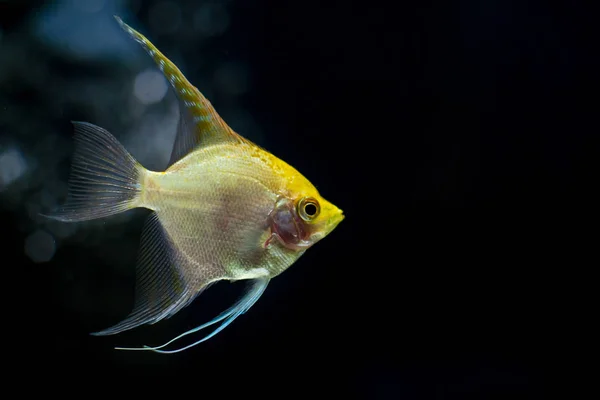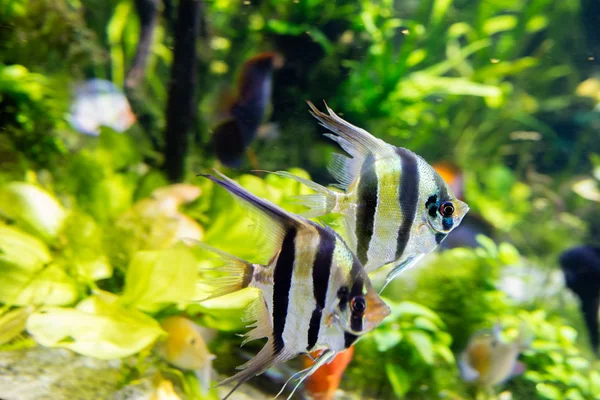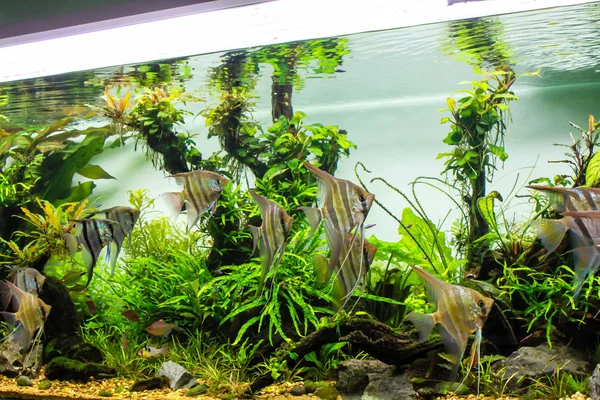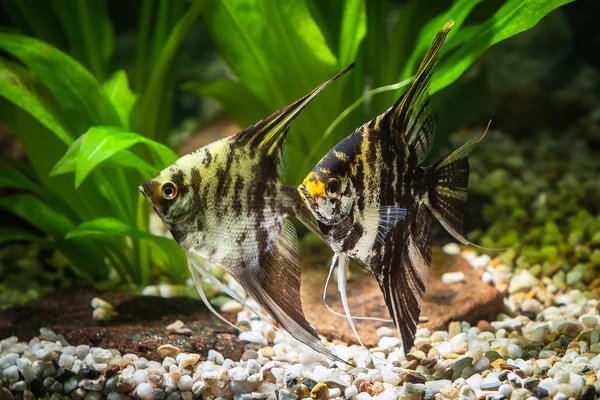Are you worried that your angelfish is incapable of living alone in its tank? Is your angelfish displaying signs of loneliness when kept alone in a tank and whether or not it’s showing signs of shoaling behavior?
In this article, I’ll answer these questions about the aesthetically pleasing angelfish and whether or not it can survive alone in an aquarium.
Yes, angelfish can live alone, but it’s better not to make your angelfish live alone in a fish tank.
Angelfish are better kept in groups in a fish tank to avoid stress and health hazards. A single angelfish can get lonely quickly, though it doesn’t always need a tank mate. To help establish the social hierarchy of the angelfish, you should keep six angelfish in the same aquarium to prevent the negative impact of loneliness.
Can Angelfish Live Alone in a Single Tank?

Having your angelfish live alone in a tank is asking for trouble. It’s challenging for the shoaling fish to be left alone in the tank as it might lead to stress, depression, and other health-related issues.
Every fish likes to be kept in a tank that imitates its natural habitat, so as an aquarium enthusiast, you should try to do the same with your angelfish.
This condition could include a group of angelfish living and swimming together in a shoal. Your angelfish has a natural tendency to belong to a community, even if it’s not their own.
But if you want to keep a single angelfish in your tank, make sure you choose an adult angelfish as they’re more resistant to the stress arising from loneliness.
Mature angelfish are better equipped to be alone in the tank to assert their territorial dominance. But avoid experimenting with young angelfish as it would be considered an inhumane treatment of this social, community-loving fish.
Can Angelfish Live Alone in a Community Tank With Other Fish?

You can keep your angelfish in a community tank, but you must be careful to keep them with the right tank mates to avoid triggering an aquarium war.
If you want to keep just one angelfish in your tank, turning your tank into a community tank could be your best bet. You can easily keep different types of fish together in community tanks, though they might lack a shoal to swim with.
You should note that angelfish are pretty territorial, meaning you need to take special care of the kind of fish you keep with your angelfish in a community tank. Below are the factors to consider when keeping your angelfish with other fish in a tank:
Keep a Relatively Bigger Fish
Avoid keeping small fish with your angelfish in the same aquarium; otherwise, it could be your angelfish’s next meal. Therefore, when selecting the ideal tank mates for your angelfish, keep a bigger fish almost the same size as your angelfish. However, be careful not to keep a predatory fish with your angelfish to protect it from attacks.
Do Not Keep Aggressive Fish
Avoid keeping fin nippers and fish with aggressive tendencies with your angelfish in your community tank, as this could result in a tank war. Keeping other species with your angelfish should be a careful decision based on the traits and temperament of the other fish since you don’t want to expose your angelfish to harm.
Size of the tank
You must conduct adequate research on the ideal tank size that is habitable for your angelfish and other fish in the tank. A bigger tank of about 55 gallons should do the trick and allow you to keep other species of fish and help you recreate a natural habitat for your fish.
Keeping a community tank requires a lot of work and commitment, but it’s always worthwhile when you observe the beauty of different fish swimming around in your community tank.
Downsides Of Keeping Your Angelfish Alone in A Tank
We have reviewed how keeping an angelfish in the tank alone could negatively impact the fish. Adult angelfish might not react adversely when kept alone in a tank, but younger fish lack the resilience to swim alone in a big tank.
Below are the negative impacts that can affect your angelfish when kept alone in a tank.
Stress
Young angelfish are small, sensitive, and will be stressed if kept alone in a tank. The feeling of isolation is frightening for the fish and is similar to the way a person would feel if kept isolated in a room for extended periods.
Isolation causes stress to captive fish and harms their health and wellbeing.
Loneliness
It’s not uncommon for people to believe that fish don’t feel anything, but that’s a huge misconception. Your fish do get lonely, especially the young ones.
Therefore, it’s your responsibility to limit stress and loneliness in your fish, so be aware that your angelfish is capable of feeling and needs a companion to enjoy its habitat.
Loss of Appetite and Lethargy
You might find this surprising, but your angelfish is likely to lose its appetite and become depressed from being alone.
If you keep your angelfish alone in an aquarium, they won’t eat as much as they should.
One fish kept alone will be listless and passive. Solitary fish won’t swim as vigorously as they would if kept with other fish.
Angelfish tend to hover in one place if they don’t have companionship and won’t display any desire to eat or play.
Benefits of Keeping Angelfish With Companions

Now that you’re aware of the health hazards of keeping angelfish alone in a tank, you should know about the many benefits of having tank mates for your angelfish.
Below are the benefits of having companions for your angelfish:
Stress Reduction And Activeness
Lonely fish are sluggish fish. They lose interest in doing anything in the tank. If this is how isolation affects a fish, imagine if this were you. How would you feel living like this?
By eliminating the problem of loneliness for your angelfish, you’ll be able to keep it safe from stress and diseases caused by isolation.
Companionship for your angelfish will reduce the stress of living alone in a big tank because the stress of performing every activity alone and saving itself from other factors can be exhausting and energy-consuming.
You can solve these problems by introducing new fish or a shoal of fish into the tank to improve the quality of life for the angelfish.
The activity level of angelfish will increase once placed in a group. They become more active and can better defend themselves against predators when they swim together.
Mating
Keeping a group of angelfish in a tank enhances breeding if you intend to breed young angelfish. Once breeding begins, it won’t be long before you notice eggs from the mated pair. But it will be difficult to keep the eggs safe in the tank, so it’s best to place the mated pair in a separate breeding tank once they display breeding rituals or behavior.
Low Energy Consumption
The concept of hydrodynamic efficiency is present in angelfish. This is why a shoal of fish often features less fatigued fish even after swimming the entire day because they’ll consume less energy.
Therefore, keeping a shoal of angelfish in the tank will result in energetic and active fish who consume little energy, leaving them robust even after a full day’s activity.
Can Angelfish Live Together in Pairs?

The answer to this question depends on the gender of the two angelfish to be kept in the same tank.
If you prefer keeping two fish, then you should opt for one male angelfish and one female angelfish together in a tank, which is a good way to ensure they’ll live peacefully together.
The attraction of the opposites also applies to angelfish as they tend to breed during the breeding season and live peacefully together.
However, the reverse applies when you keep angelfish of the same gender in the same tank. Doing this is an invitation to a tank war, as this will cause fights that can injure or even kill one of the fish.
Can Angelfish Live Alone in a Small Tank?
Angelfish can grow up to 6 inches and exhibit personality traits that mean they love to stake claim to territories. Thus, the smallest tank you should consider for your angelfish is a 20-gallon tank.
Small tanks are likely to affect the overall health of the angelfish. It’s not recommended to keep your angelfish in a tank smaller than 20 gallons.
When you consider all the factors, the answer is no. Angelfish can’t survive in a small tank. Your angelfish needs to be a part of a community in a large tank, or they’ll become depressed or die of loneliness.
How Many Angelfish Should You Keep In A Single Group?
You might be wondering about the number of angelfish to keep in a tank. However, you need to be aware that by maintaining angelfish in a shoal, they’ll develop the same social hierarchy that they do in their natural environment.
While keeping one angelfish in a tank isn’t recommended, you should also avoid keeping two angelfish in a single tank. Their territorial nature is likely to cause a tank war that will likely mean stressed, ill, or injured fish.
Minimum Group Size
The minimum group size if you intend to keep a low number of angelfish in a tank is 3, as this will reduce the stress that’s likely to develop from keeping even as few as 2 of them in the same tank.
Ideal Group Size
If you want your angelfish to be happy, you should aim to keep a small group of 5 to 6 angelfish. Keep in mind that the more fish you keep in your tank, the larger the tank needs to be.
The ideal size is a 60+ gallon tank to ensure the safety and well-being of the angelfish.
Keeping multiple angelfish in your tank is better than keeping a single fish as it can better survive in small groups rather than when kept in isolation.
Below are factors to note when keeping angelfish:
Angelfish, like all fish, have individual traits. They’re complicated creatures and have personalities that determine how they react to certain situations.
Some fish can thrive in isolation, especially mature angelfish, but other species struggle.
As an aquarium hobbyist, if you’re wondering if angelfish live alone, it’s important to take the below factors into consideration:
The Personality Of The Angelfish
Angelfish are noted for being territorial, which makes them aggressive. These aggressive tendencies are pronounced when they have mates or eggs to protect. Some fish owners often separate these angelfish pairs when they start mating to prevent them from terrorizing the whole tank.
Another personality trait of the angelfish is that they’re gluttons and will eat for as long as you feed them. Overfeeding isn’t only harmful to the fish but will foul the water faster and require more frequent cleaning.
Also, if the tank is small, angelfish will attack other fish as they believe they have to fight to protect the limited resources.
Many angelfish are also calm and peaceful fish, but this is a rarity. The cause of the aggression of the angelfish is not always apparent and makes them unpredictable.
Possible Tank Mates
Angelfish can be greedy and eat anything that fits into their mouth, such as smaller fish. To keep smaller fish from becoming food for the angelfish, choose tank mates of compatible size and species.
What Are the Ideal Angelfish Tank Mates?
You can keep your angelfish with other fish, but you need to understand that not all fish are the best tank mates for your angelfish.
Angelfish, though territorial, are relatively peaceful, so you need to consider this when selecting the right fish as a tank mate for your angelfish.
Despite the possibility of keeping your angelfish with different species of fish, it might be best to restrict schooling of your angelfish to other angelfish rather than with other species.
You should accept that angelfish will seek to maintain a shoal habitat the way they would in their natural habitat.
Below are some of the best tank mates for your angelfish:
- Praecox Rainbow Fish
- Betta Fish
- Boesemani Rainbow Fish
- Bristlecone Pleco
- Keyhole Cichlids
- German Blue Cichlids
- Swordtails
- Dwarf Gourami
- Zebra Loaches
- Platies
- Mollies
- Corydoras Catfish
Why Do Angelfish End Up Alone?
Below are reasons why people sometimes keep a single angelfish:
Fear of Conflict
If you randomly introduce angelfish into a fish tank, you’re likely to cause a territorial conflict between the fish. It’s better to keep the angelfish alone until you find an ideal tank partner.
Acclimating
You might see an angelfish alone in a small aquarium to enable the fish to get accustomed to the water.
Other reasons are:
- Isolation
- A popular trend
Conclusion
Angelfish are shoaling fish, and keeping a single angelfish in a tank could be considered inhumane to a fish better adjusted to a social hierarchy. It’s not recommended to keep angelfish alone unless you keep them in a community tank with compatible fishes.
Loneliness and stress are emotions that can affect angelfish if left alone in the tank, which can cause depression and other health issues. However, despite the negatives of keeping these fish alone in a tank, you should also avoid overstocking your tank with angelfish. Too many fish will disrupt the tank as they seek territorial dominance, and their aggression may create a tank war.
Overall, angelfish are one of the most popular and easiest fish to keep. Who can deny their beauty as they glide through the tank? But you need to take special care of them and address all their needs to enjoy these lovely and graceful fish for many years to come.
Related Reading:
- Can Guppies and Angelfish Live Together?
- Can Angelfish and Goldfish Live Together?
- Can Glofish and Angelfish Live Together?
- A List of the Top 10 Reef Safe Angelfish
- Can Goldfish Live Alone?
- What Are Good Nano Reef Tank Recommendations?

